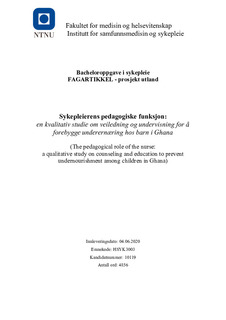Sykepleierens pedagogiske funksjon: en kvalitativ studie om veiledning og undervisning for å forebygge underernæring hos barn i Ghana
Bachelor thesis

Permanent lenke
https://hdl.handle.net/11250/2669456Utgivelsesdato
2020Metadata
Vis full innførselSamlinger
Sammendrag
Introduksjon: I Ghana er underernæring hos barn er et vedvarende problem. Undervisning og veiledning av omsorgsgivere står sentralt for å forebygge underernæring hos barn i Ghana. Sykepleiere på helsestasjon og på hjemmebesøk har en sentral rolle i dette helseforebyggende arbeidet. Variert tematikk og framgangsmåter som tilrettelegger for individuelle tilpasninger, belyses av forskningen som viktig for helhetlig oppfølging. Forskning og teori vektlegger også viktigheten av tillit- og relasjonsskapende kommunikasjon for god veiledning og undervisning. Språkbarrierer, sosioøkonomiske forskjeller og kunnskapsmangel hos helsepersonell og omsorgsgivere er blant de kulturelle og lokale utfordringene ghanesiske sykepleiere må tilpasse arbeidet etter. Prosjektet er utført i samarbeid med sykepleierutdanningen ved NTNU og University of Ghana som del av en utvekslingspraksis i Ghana.
Metode: Metoden er observasjonsstudium, basert på ustrukturerte, kvalitative observasjoner, for å undersøke hvordan sykepleiere forebygger underernæring ved hjelp av veiledning og undervisning til omsorgsgivere. Observasjonene er utført på privat og offentlig helsestasjon (CWC), samt hjemmebesøk, i Accra, Ghana. Studiets funn består av åtte observasjoner. Graneheim og Lundman sin modell er utgangspunkt for analyse av dataen.
Resultat: Mine funn viser generelt variert, men noe ensidig tematikk. Bruk av hjelpeverktøy viser positiv effekt. Språkbarrierer, manglende systematikk og kunnskapsmangel er faktorer som hindrer god veiledning og undervisning. Én-til-én-veiledning på hjemmebesøk kan virke som å være spesielt gunstig for å fremme tillit og sykepleier-pasient-relasjonen. Studiens styrker og svakheter er diskutert.
Konklusjon: Sykepleieres veiledning og undervisning av omsorgsgivere står sentralt for å forebygge underernæring hos barn i Ghana. Økt fokus på hygieneveiledning, hjelpeverktøy, systematikk og sykepleieres opplæring kan styrke vellykket undervisning og veiledning, og kan fremme individuelle tilpasninger og god dialog. Dette, samt hjemmebesøk, ser ut til å styrke tillit og relasjon, noe som står sentralt i god veiledning og undervisning. Behovet for videre forskning på temaet, er beskrevet. Introduction: In Ghana, undernourishment among children is a continuous health challenge. The nurses in children welfare clinics (CWC) and home visits take significant part of the preventive work through education and counseling of caregivers. Covering different subjects through methods that provide individualized counseling and education, is important. Also, communication that improves thrust and a good nurse-patient-relation is identified as important for successful education and counseling. Challenges nurses face may face are socioeconomical differences, language barriers and caregivers or nurses limited knowledge. The study has been conducted in collaboration with NTNU and the University of Ghana, as part of an exchange program in Ghana.
Method: The study is based on unstructured, qualitative observations in order to examine how nurses prevent undernourishment among children through counseling and education of caregivers. Data has been collected in a private and a governmental CWC, and home visits, in Accra, Ghana. The data consists of eight observations. The model of Graneheim and Lundman is used for data analysis.
Results: Though results show variation, they indicate lack of education and counseling on some subjects. Language barriers, lack of systematics and education of nurses seem to challenge successful education and counseling. Use of simple tools and one-on-one-counseling seemed to improve it. Results indicate that especially home visits contribute to good communication and building thrust and the nurse-patient-relation. The study´s strengths and weaknesses are discussed.
Conclusion: The nurses pedagogical role through counseling and education of caregivers is important in preventing undernourishment among children in Ghana. An increased focus on counseling on hygiene, using simple tools, improving nurses’ knowledge and the systematics could improve successful education and counseling. It seems to help individualize the education and counseling, and strengthen thrust and nurse-patient-relation, which is important for success. Need for further research is described.